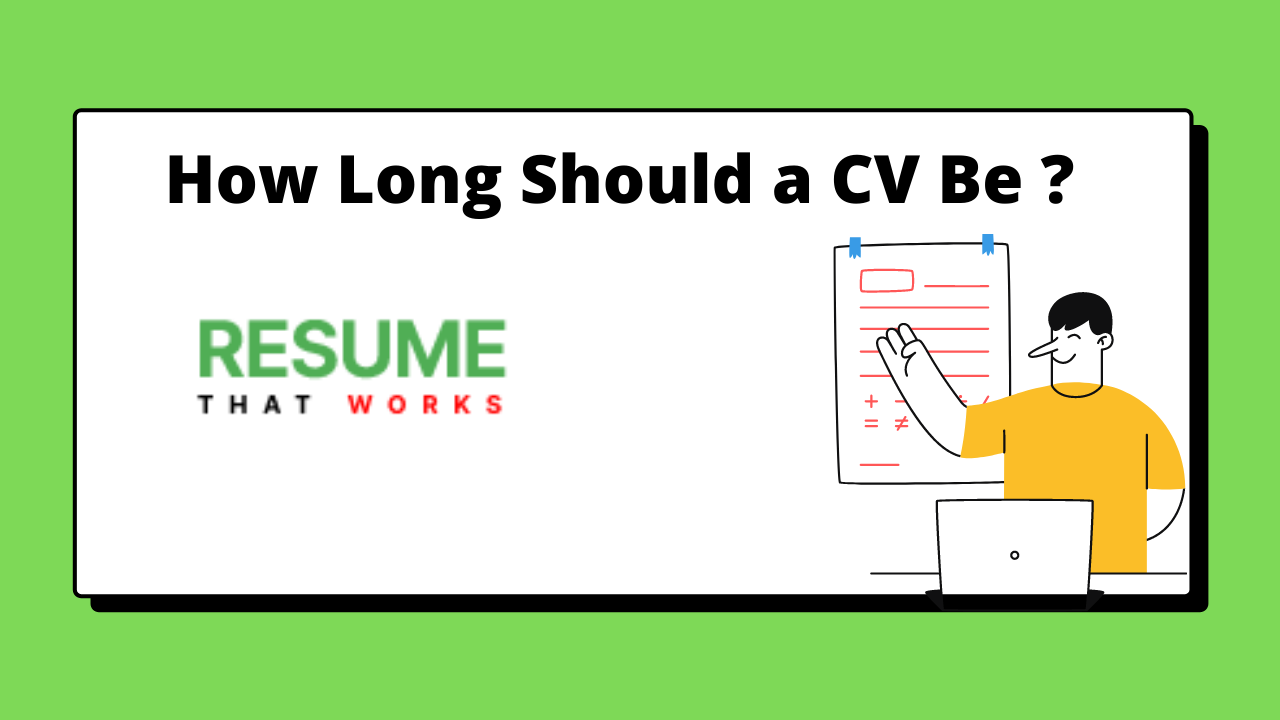How long should a CV be? This question keeps one bewildered throughout academic and professional life. It is an important question indeed, one on which your career depends. Your CV is what sets your identity and first impression in front of employers. It tells them about your credibility and what you can offer the company. So, is your CV long enough? Or short enough? Let’s see and find out.
What is a CV?
Short form of Curriculum Vitae, a CV is a written summary, a document that showcases your education, qualification, achievements, and professional experience. It portrays the highlights of and shows a glimpse of your professional as well as academic journey.
Along with that, a CV also contains your personal statement and hard and soft skills. This is to exhibit how you are and what to expect from you as a professional individual. A CV is the first and the essential thing recruiters will ask you to show at job interviews.
Is There a One Size Fits All CV Length?
Before declaring the ideal length of a CV, let’s get one thing straight. It’s not the word count that matters; it’s the value, quality over quantity. The value every person must have as a job candidate varies, of course. If you are an undergraduate, you might be short on skills, and if you are a fresh graduate, you might not have enough experience.
On the contrary, if you are in the job market for a decade, you would have so much to show. So, does that mean you should fill out pages and pages with your experience and skills? Absolutely not! When it comes to how long a CV should be, the goal is to showcase your abilities as concisely as possible.
So, How Long Should Your CV Be?
Those who have recently graduated, struggle the most on what to add to a CV when they don’t have much experience. And while they don’t have much to add, won’t a shorter CV hold them back from getting a job? Supposedly, how long should a graduate CV be? The answer is that if you are applying for an entry-level role, a one-page CV is good to go with. The same rule applies to how long a CV should be for grad school.
If you have got abundant industry experience of several years, don’t exceed two pages while creating a CV. Include only the relevant and important bits. Try to put all your experience and skills as concisely as possible in two pages. If you can do so within a single page, that is fine too. However, if you are applying for a senior-level position, a single-page CV can mean insufficient experience. In that case, a two-page CV can be a wiser option, not more than that.
There are a few cases though, where a CV can exceed two pages. For residency, even a two-page CV can hardly do justice. The right CV length for residency normally ranges from 3 to 5 pages. A residency CV should include clinical experience, research, and publications, as well as presentations. Hence a long CV is necessary.
How to Smartly Reduce a CV to the Right Size?
But how to cut out the details? All those seem important, you ask. Well, you can always reduce the size of your CV, and smartly so. Take a look at these tips to achieve the right CV length, without cutting out the important bits, of course.
Concise Personal Statement
The right length of a CV personal statement is as concise as it can possibly be. The personal statement goes on top of the CV, keep it short, sharp, and concise so the hiring manager can quickly move on to other details. Otherwise, he will stop reading right there on top and put your CV aside.
Don’t brag on and on about your professional journey. Rather, mention your important skills and goals in a few short sentences. Tell them what it will be like working with you and what value you can offer to their company. In short, tell them why they should hire you for the job.
Formatting. Yes, it matters!
Formatting might seem trivial at first but it is a crucial factor and can reduce your CV to the right length. You don’t want to throw out all the details on the paper no matter how they look, do you? How have you written matters as much as what you have written? Don’t just put on content into large paragraphs, fonts, and headings. Be smart. Otherwise, your CV will end up being unnecessarily long and fluffy.
Use bullet points in your CV, particularly if there is a lot of information. Make the paragraphs single-spaced and use 1.5 or double line spacing between different sections. As for the font size, make sure it does not exceed 10 or 12 pt. It doesn’t mean you can make the font size too small for the recruiter to read. Use H2 or H3 headings, not H1. The long CV format needs to be even more crisp and concise. The recruiter must be able to easily navigate through all the information and digest it.
Your best bet at creating a CV with the right length is to use an already built CV template. Everything will be sorted out, from the formatting to the sections. All you will need to do is put in the information. You can choose from both short CV templates and long CV templates, according to your requirements.
Stay Relevant
Exclude the unnecessary information from your CV. Make sure it only lists information that fits the role you are applying for. It is absolutely unnecessary to include everything about your professional life. Keep your focus straight on the position you are applying for. Only think about which information can get you the role, and add that, that’s all.
Related : Download Public Relations Resume
If you have got decades of professional experience, don’t add all of those. Drop any experience that is more than 10 years old or is not relevant to the position. There is no need to add salary details of each job you did, or your weight and height. Also, cut out your personal interests. The recruiter will not be interested in them.
Winding Up
This article must have debunked a lot of misconceptions and myths about the right length of a CV. By doing that, you must be completely clear about what you should add to a CV and how long your CV should be. Remember, with the right CV length, you can be confident that it will be read, considered, and can definitely help get you the job.




